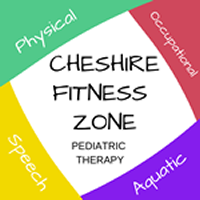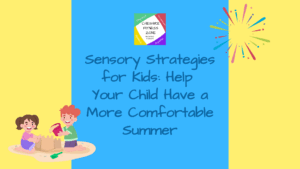By Ms. Lauren Brickett
Everyday Ways to Add Music to Your Kids Routine!
Did you know that there are different ways to incorporate music into your child’s day that will support communication development? Below are different ideas to help you use music to do just that! Remember, you don’t have to have a “professional” voice to sing with your child. Your child loves you unconditionally and will be excited to play with you in this musical way.
Routines
Whether it’s for brushing teeth, changing a diaper, or at bedtime, using a song for a routine can help bring some fun into these everyday experiences. For example, you can take the tune of “Row, Row, Row, Your Boat” and make up your own song for brushing teeth… “Brush, Brush, Brush your teeth, time to clean your teeth, first the top teeth, then the bottom, and don’t forget your tongue!” You can repeat the song as many times as you want while your child is brushing his or her teeth. In the example song, you are supporting your child’s receptive language development by providing verbal directions and by singing the correct sequence of the actions needed to complete the task of brushing teeth.
Transitions
Transitions can be challenging to navigate, especially if your child must stop engaging in a preferred activity. Providing notice that a transition is going to happen before it does (i.e. “we will be eating dinner after playtime”) and then using a song while the transition is happening can be helpful. The song will not only be a fun distraction or assistance in redirection, it will also explain what the child can expect during the transition. For example, you can use a clean-up song as a transition from playtime to dinner. Something like, “clean-up, clean-up, clean up all the toys! First the toys get put away and then it’s time to eat!” You can set those words to any tune that you think your child would enjoy. You can encourage your child to sing along and you can repeat the song as many times as you need.
Playtime
Playing with toys is a great time to include songs; You can sing about anything you are playing with! Let’s say your child is working on the /b/ sound and if you have a few toys that start with /b/, you can sing a song about them. Pick a tune you know or make one up and you can sing a song like this, “Ball, Bucket, Bell, and Balloon. Look at these things that start with “B”! Buh, Buh, Buh, Buh, all these things start with “B”!” You are modeling the sound in words and the sound by itself. One benefit is that your child will hear numerous accurate productions of the target sound by listening to you sing a song like this. Another way you can use songs during play is for different language concepts, like following directions or spatial concepts (i.e. in, on, under, etc.). You can sing something like this (to the tune of “There’s a Hole in the Bucket”): “Put the ball on the table, the table, the table, put the ball on the table and leave it right there!” “Put the block on the top, the top, the top, put the block on the top and build a big tower!” There is no limit to what you can sing about while playing!
Dance party
Music and movement! You can put on your favorite song and just have fun singing and dancing with your child! Or you can play a ‘dance and freeze’ game. To play ‘dance and freeze’ you will stop the music at random and you and your child have to freeze when the music stops. Once the music starts again, you can start dancing. Or you can pick an instrumental song (music/instruments only-no lyrics) and you can pretend to be different animals while dancing to the music…your child can pick an animal and you can imitate your child’s movements or you can move like an animal and ask your child to guess which animal you are pretending to be. Social language can be supported during a dance party as well by focusing on different aspects like: turn-taking, use and understanding of body language and facial expressions, and practicing expected social behaviors.
Incorporate Music Into Your Daily Routine!
It may take your child some time to get used to you singing songs during routines, transitions, or playtime. However, with repetition, your child will begin to adapt to this new addition! With all the above ideas, you can talk with your child’s speech therapist for ways to tailor them to your child’s specific communication needs. Have fun and happy music-making!

Meet the Author: Lauren Brickett
Ms. Lauren Brickett is a Speech-language pathologist at Cheshire Fitness Zone, and has been practicing since 2013.
Ms. Lauren previously led CFZ's Speech, Music, & Movement program!



